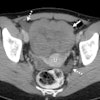Tuesday, November 28 | 11:50 a.m.-12:00 p.m. | SSG02-09 | Room S504AB
In this session, researchers will describe how deep learning shows potential for identifying patients with functionally significant coronary artery stenosis.While coronary artery disease is increasingly being identified using coronary CT angiography (CCTA), the modality does not currently provide high specificity for determining the functional significance of detected stenoses, according to Majd Zreik from University Medical Center Utrecht in the Netherlands.
As a result, patients often undergo invasive coronary angiography to determine the fractional flow reserve (FFR) -- a quantitative marker and the current reference standard for determining the significance of coronary stenosis, he said. Several methods have also been proposed -- including FFR-CT -- for automatically and noninvasively identifying patients with functionally significant stenosis by analyzing the coronary arteries on CCTA.
Unlike previous techniques that base their analysis on the coronary artery tree, the researchers proposed a method that can identify significant stenosis by analyzing only the left ventricle (LV) myocardium on CCTA, Zreik said. In their approach, deep learning is first used to characterize the LV myocardium. Then, a conventional machine-learning classifier is applied to identify patients with functionally significant stenosis based on the characteristics of the extracted myocardium.
"Our results indicate that even though the ischemic changes caused by a functionally significant stenosis in the LV myocardium -- as seen in rest CCTA - are subtle, the deep learning seems to be able to extract those changes," Zreik told AuntMinnie.com. "When confirmed in larger studies, this novel approach has a potential to reduce the number of patients that unnecessarily undergo invasive FFR measurements, thereby sparing patients [from undergoing an] unnecessary invasive procedure."
The method may also lead to lowered costs, he said. Hear more about the research by attending this talk on Tuesday.





















